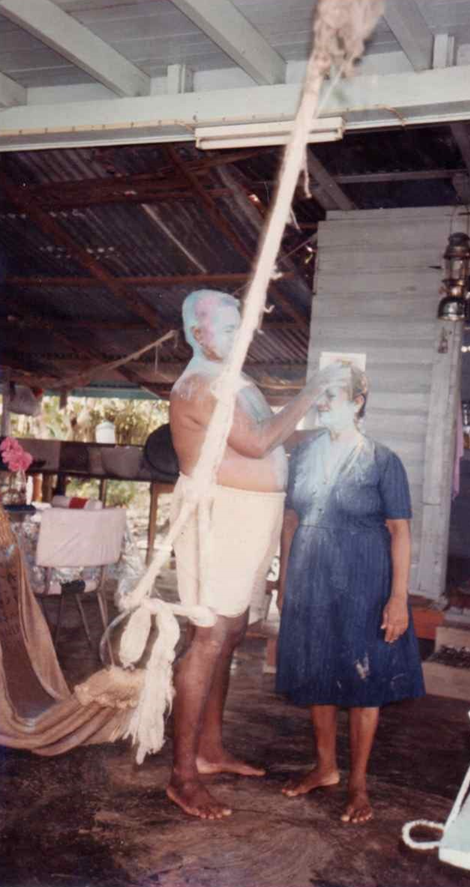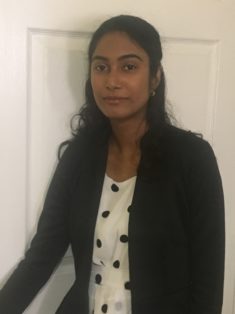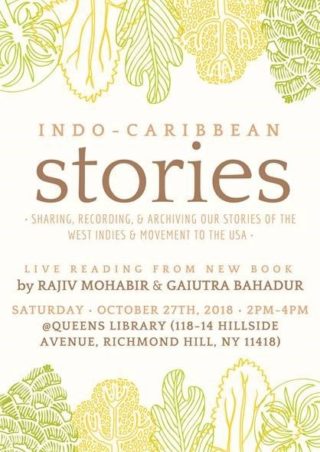Image description: Four flyers hang beneath a string of lights that alternatively feature the words "stories" and "share!"
Ugeita Tewari
Why should our stories matter? Our stories define who we are. They are our identities, the experiences, and mistakes which have taught us valuable lessons. Indo-Caribbean Stories, held at the Richmond Hill branch of the Queens Public Library on Saturday, October 27, 2018, was an event where we shared our stories to inspire others and show how we all have something in common, whether it is a pain, struggles or sacrifices; we can build a connection with someone’s story because it can be closely related to our own. The stories of the West Indies and movement to the United States of America evoked our cultures, religions, ancestors’ histories and gave us a sense of belonging.
Entrepreneur Richard Branson once said that “if someone offers you an amazing opportunity, but you are not sure you can do it, say yes and then learn to do it later.” This is exactly what I did. Being a Business Administration major at Borough of Manhattan Community College in my second semester, I took an Asian American History class which was interesting and introduced me to a variety of historical events associated with Asian Americans. My professor Dr. Linta Varghese, who is my faculty advisor for this internship, approached me with the offer to consider being a part of an internship that was a collaboration of The Center of the Humanities at The Graduate Center, CUNY and the South Asian American Digital Archive (SAADA). I was a bit skeptical at first since this wasn’t related to my major or career path. However, I said yes and decided to give it a shot with the intention of gaining experiences which might be useful in the future.
Before this internship, I had never heard about the work done by SAADA, a not-for-profit organization established in 2008. They are involved in “documenting, preserving, and sharing stories of South Asian American history.” As they state on their website, they “envision American and world histories that fully acknowledge the importance of immigrants and ethnic communities in the past, strengthen such communities in the present and inspire discussion about their role in the future.” SAADA has produced project such as The First Day Project, Tides, and Our Stories.
In the U.S., the Indo-Caribbean community is often underrepresented when people talk about the Asian American and the South Asian Diasporas. Seeing this gap, SAADA’s Executive Director Samip Mallick and Prof. Prithi Kanakamedala reached out to community organizations about holding an event where Indo-Caribbeans could be recognized within the Richmond Hill community. Richmond Hill has a large population of South Asian Americans (Indians, Pakistanis, and Bangladeshis), Indo-Caribbean Americans (Trinidadians, Guyanese, Surinamese, and Jamaicans), and also has the largest Sikh population in the city.[1] The goals of this event were to celebrate Richmond Hill’s Indo-Caribbean community through story circles. Special guest speakers Rajiv Mohabir and Gaiutra Bahadur read from their work, and the community shared stories of ancestry, identity, and collective memory. SAADA recorded some of these stories with the intention of archiving them.
My main objective in this project was assisting with outreach for this event. I developed a working relationship with two dedicated individuals who are passionate about histories of Indo-Caribbeans and Asian Americans, Samip Mallick and Suzanne Mahadeo, who was then the director for the Indo-Caribbean Alliance (ICA). The ICA is a non-profit organization located in the Richmond Hill community, whose mission is “to unify and advance Indo-Caribbean and South Asian interests by fostering joint and collaborative actions among different peoples, organizations and businesses.” Both organizations collaborated on the structure and content of the event, while I made the marketing plan to inform the residents of the Richmond Hill community of the Indo-Caribbean Stories event. The countdown began, and, two weeks before the event, the posters were designed and printed. At this point, I was confronted with my greatest challenge in terms of outreach. Even though I have lived in Richmond Hill for almost three years, a community well-known for its large group of residents from the Caribbean, interacting with residents was a bit nerve racking at first because I had never done outreach before. However, I got more comfortable with continuous conversations and interaction with residents at subways, libraries, temples, schools, parks and busy shopping areas, who shared their interest and views on this event. Residents in the community were excited to hear about the event, especially about the guest speakers and talking about their journeys to the U.S.A. Many shared how they were happy to have a chance to attend an event where their fellow Indo-Caribbean people would be present and talking about their homelands.
Even though I dislike public speaking I decided to participate in this event to experience and be a part of a space where my story could be heard. I shared my story in front of a group of about 40 people, which was recorded and archived in SAADA’s digital repository. Participants were asked to share a photograph or any object that holds significant meaning to them and connects to their story. I shared a photograph of my grandmother and grandfather at their house in Guyana playing the festival of Holi. I grew up on a small island called Leguan in the Essequibo River. This was my home until I moved to New York almost three years ago. The house in the photo is where I spent my childhood, the best part of my life, and it holds many memories for me. My grandparents were the ones who built the foundation of being East Indian in Guyana within our family. My grandfather was a typical farmer and my grandmother a housewife, who made sure they instilled the cultures and traditions of Hinduism in their family. They taught me to celebrate special festivals, performed religious prayers every Sunday, introduced me to Bollywood movies and music and encouraged me to value education because they believed that it could solve poverty.

The photo reminds me of my grandmother’s dream of going to America but, unfortunately, she passed away one year before her dream could become a reality. The dream to go to the land of opportunities and bring her children and grandchildren to America was fulfilled by my grandfather. After ten long years, our sponsorship was approved, and I arrived in America with my mother and brothers. The opportunities I received were possible because of my grandparents' sacrifices to give the future generation a life which they weren’t fortunate enough to have themselves.
As an adult in the real world today, I realized that knowing who I am, my identity and where I belong are questions that I wonder about all the time since I’ve arrived in New York. Listening to others’ stories at the event showed that we all have in common the desire for a better life that is free from struggles, hoping for safety and a better standard of living. The sacrifices we made of leaving our families, properties, memories, and homeland to travel to America brings struggles of battling with being accepted into a country which only sees us as immigrants. The community stories shared were intense and emotional, leading to supportive conversations and networking among the audience after the event came to an end. The event surpassed its closing time with the audience attached to all the incredible stories shared. Attendees even stayed until the library was about to close, after the event was finished, to talk to each other, as well as Rajiv Mohabir and Gaiutra Bahadur. The stories that resonated with me were stories associated with the challenges of domestic violence, getting annoyed and cutting communication with your parents who are pressuring you to get married, losing your grandmother and living in a family with a Muslim mother and a Hindu father.
My experiences from this internship not only created relationships and networking opportunities but working with SAADA opened my eyes to being more involved in my community and prompted me to volunteer with organizations in the Queen's community such as ICA and DRUM. The Indo-Caribbean Stories event showed me the impact storytelling might have on a person. I built connections and felt closer to people sharing their stories. Through story sharing, I realized that I am not the only one facing similar challenges of migrating from my country and adapting to the U.S. It doesn’t matter which part of the Caribbean we are from, our stories can be valuable, inspirational and give others support to be proud of their history, race, and identity. Community storytelling created a safe place for us to reveal the part of us we keep hidden inside: an area of healing, forgiving and letting go of emotions.
[1] The Population by Race 2012-2016 America community survey done in the Richmond Hill community grouped White alone persons (38.8%), African American alone persons (7.1%), Native American alone persons (0.7%), Asian alone persons (26.0%), other race alone persons (21.7%), Persons of two or more races (5.7%), and the Asian Population by National Origin 2012-2016 community survey classified Indo-Caribbean persons into “Asian Indian Persons.

